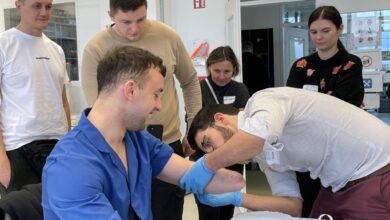By The Tri-State Defender
Surprise! Racism—that “thing” white people say doesn’t exist—has dire long-term effects on the health of black children and adolescents, according to a report released by the country’s largest group of pediatricians.
The report, crafted into a first-of-its-kind policy statement from the American Academy of Pediatrics, calls racism “a socially transmitted disease passed down through generations, leading to the inequities observed in our population today.” It draws on 180 studies to reach its conclusions and includes specific recommendations.
It also notes that in Trump’s America (read: “the current political and cultural atmosphere,” according to the Washington Post), the danger to children is more acute and the work more urgent.
“If you look at what’s in the news today, in social media, on Twitter, there is so much kids are exposed to,” said Jackie Douge, a pediatrician who co-wrote the policy, to the Post. “As much as you want to keep it in the background, it’s not in the background. It’s having direct health effects on kids.”
The effects of racism have long been documented by the medical community and has dire effects on our health, as The Post reports:
“Exposure to racism in adults has been linked to an increased risk of heart disease, depression and other ailments. And researchers have increasingly identified dangers racism presents to the development of babies and children. Studies have found lower birth weights in babies born to African American mothers who experience discrimination. A recent analysis found an increased risk of premature birth among Latina women following Trump’s election, part of a pattern of poorer health outcomes among Latinos during his administration. Other recent studies have found an increased risk of depression, obesity and greater susceptibility to sickness among children who are exposed to racism. Researchers have linked racism experienced by children to worsened sleep, higher rates of doctor visits and lower self-esteem.
“One of the main mechanisms responsible for those effects, researchers say, is the way prolonged stress wears away at people’s bodies. Experiences of discrimination can flood the body with stress hormones such as cortisol — a chemical that readies the body to fight or flee. Studies have show that even the anticipation of discrimination can trigger the stress response. Over time, stress hormones can lead to inflammatory reactions that make the body more susceptible to chronic diseases.
Though it can sometimes be difficult to parse out racism from all the other structural inequalities, including a disproportionate number of black children being jailed, poverty, violence and food insecurity, clearly there is a link to health outcomes in black children, according to researchers.”
As Kyle Yasuda, president of the American Academy of Pediatrics notes to the Post: “It’s more than just medicine and genetic makeup. It means looking at all the determinants of health. And science has shown us racism plays a part in that equation.”
The new report will be issued to the AAP’s 67,000 members with an extensive list of recommendations, reports the Post. The AAP News and Journals, in summarizing the report, says that doctors of providers “might ask about recent events in the community that may have had an impact on the patient and family, determine the need for counseling or alternative forms of support such as affinity groups at school, and provide anticipatory guidance on effective communication and strategies to keep children and adolescents safe. Pediatricians can collaborate with local schools, school health systems and justice systems to ensure that all patients meet their developmental and vocational milestones.”
In addition to diversifying the field and training pediatric staff to be more “culturally competent,” the policy also recommends that “pediatricians reflect on their own biases and integrate structural and individual-level strategies that optimize professional practice.”
From the report:
“By engaging patients and families in clinical care settings and through effective anticipatory guidance, pediatricians can help parents raise children and adolescents who can do the following:
- identify racism when they see (bystander) or experience it (target);
- differentiate racism from other forms of unfair treatment;
- oppose the negative messages or behaviors by others; and
- replace it with something positive or constructive to prevent the observed longitudinal health and developmental consequences associated with internalizing those experiences.”
Ultimately, although we know racism has an adverse effect, we simply don’t know how deeply it affects our children.
“It’s a new age of racism,” said Nia J. Heard-Garris, a pediatrician at Northwestern University, to the Post. “I see them trying to shut it out and tune it out. I think they’re trying to figure out ways of coping that previous generations didn’t have to. And I don’t think we’ll know what the consequences are going to be for a while.”
This article originally appeared in the New Tri-State Defender




